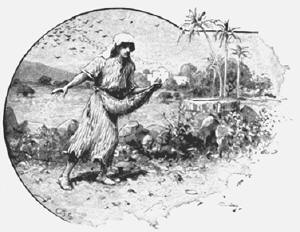The Gospels: Mark 4:16-20 – A Lesson About Seeds
Others, like seed sown on rocky places, hear the word and at once receive it with joy. But since they have no root, they last only a short time. When trouble or persecution comes because of the word, they quickly fall away. Still others, like seed sown among thorns, hear the word; but the worries of this life, the deceitfulness of wealth and the desires for other things come in and choke the word, making it unfruitful. Others, like seed sown on good soil, hear the word, accept it, and produce a crop—some thirty, some sixty, some a hundred times what was sown.”
When sowers in Jesus’ day would sow their seeds, some of the seeds would naturally wind up in places unfavorable to growth, while most of the seeds wound up in good soil. Jesus used the result of the seeds in the various kinds of terrain to illustrate the behavior of people with the gospel. He speaks of rocky places, thorny places and good soil.
 It is important to note that the parable does not say that God sows people on rocky places; it says that the way some people receive the gospel is like seed sown on rocky places. It is a comparison, an illustration of how some people deal with the gospel. It is not a justification for viewing God as deliberately making it impossible for some people to embrace the gospel.
It is important to note that the parable does not say that God sows people on rocky places; it says that the way some people receive the gospel is like seed sown on rocky places. It is a comparison, an illustration of how some people deal with the gospel. It is not a justification for viewing God as deliberately making it impossible for some people to embrace the gospel.
People who abandon the word of God in the face of persecution are like seeds that grow on rocky places and therefore have little root. In a similar manner, people who let the word of God take a back seat to the worries of life and the pursuit of wealth are like seeds that get choked among thorns and shrivel.
In contrast, people who hear the word of God and accept it and produce the fruit of it are like seeds that germinate in good soil where there are no impediments to healthy growth.
Listening to Jesus
People, however, are not actually seeds, and God does not actually cast people into situations that prevent them from accepting the gospel. Jesus’ parables should not be pushed beyond the point that Jesus intended them to make.
Seeds don’t think. They don’t make choices. They don’t have the ability to ask God for help. The point of the parable is not to tell us that we are hapless seeds doomed to whatever fate might chance to befall us because of the sower’s indiscriminate scattering. The point of the parable is that we should take steps to prevent ourselves from acting like helpless seeds.
When we find ourselves letting the cares of this world put the gospel on the back burner of our lives, then Jesus wants us to take note and make a change. He wants us to deepen our spiritual roots, to chop up the spiritual thorns in our lives. He wants us to nestle into the good soil of spending time in his word, of taking our issues, our hopes, our fears and our triumphs to him in prayer. He wants us to put the word of God to use in what we choose to do, to let the gospel flow out from us in kindness, mercy and peace.
It is easy to use the parable of the sower as a tool to judge others, to look down on people we think are weak in the faith and bound to fall away from the word of God. It is harder, but far more useful, to let the parable of the sower teach us and admonish us to keep an eye on our hearts, to make sure that greed, pride and anxious care about possessions and self-importance are not easing into the driver’s seat in our lives.
Are you looking for a New Year’s resolution? How about this one: Hear the word, accept it and love others as Jesus loves us. That’s the lesson of the parable of the sower.
Author: J. Michael Feazell, 2005, 2012
